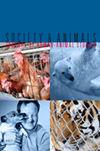想想(野猫):野性、生物力量和捕食的伦理
IF 1
4区 农林科学
Q4 SOCIOLOGY
引用次数: 2
摘要
猫混淆了明显的区别:尤其是人类和自然世界之间的区别。因此,它们是“野性”的主要例子:一类既不是家养的,也不是野生的,而是在这些领域之间移动的非人类主体。有人认为,运动的潜力会引发特定的社会焦虑和关于猫狩猎行为的争论。根据米歇尔·福柯的生物政治工作,结合“捕食者问题”的伦理悖论,有人认为,对猫捕食的伦理控诉最好被理解为猫能够在家庭和野外的不同监管和伦理空间中移动的结果。因此,野性是人类伦理对非人性产生影响的一种手段,因此捕食被认为是一种不必要的、“不自然的”甚至是邪恶的行为。本文章由计算机程序翻译,如有差异,请以英文原文为准。
Consider the (Feral) Cat: Ferality, Biopower, and the Ethics of Predation
Cats confound clear distinctions: not least that between the human and natural worlds. As a consequence, they are prime examples of “ferality”: a category of nonhuman subjects who are neither domestic, nor wild, but instead move between those realms. It is argued that that potential for movement informs particular social anxieties and debates that emerge regarding cat hunting behaviors. Drawing on the biopolitical work of Michel Foucault, in conjunction with the ethical paradox of the “predator problem,” it is argued that the ethical indictment of cat predation is best understood as a consequence of cats’ abilities to move across the different regulatory and ethical spaces of the home and the wild. Ferality thus functions as a means by which human ethics are brought to bear on nonhuman nature, and predation is thereby framed as an unnecessary, “unnatural,” and even evil act.
求助全文
通过发布文献求助,成功后即可免费获取论文全文。
去求助
来源期刊

Society & Animals
社会科学-兽医学
CiteScore
1.40
自引率
12.50%
发文量
46
审稿时长
>12 weeks
期刊介绍:
Society & Animals publishes studies that describe and analyze our experiences of non-human animals from the perspective of various disciplines within both the Social Sciences (e.g., psychology, sociology, anthropology, political science) and the Humanities (e.g., history, literary criticism).
The journal specifically deals with subjects such as human-animal interactions in various settings (animal cruelty, the therapeutic uses of animals), the applied uses of animals (research, education, medicine and agriculture), the use of animals in popular culture (e.g. dog-fighting, circus, animal companion, animal research), attitudes toward animals as affected by different socializing agencies and strategies, representations of animals in literature, the history of the domestication of animals, the politics of animal welfare, and the constitution of the animal rights movement.
 求助内容:
求助内容: 应助结果提醒方式:
应助结果提醒方式:


